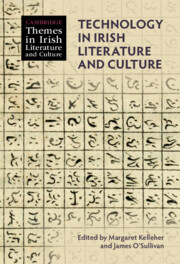Book contents
- Technology in Irish Literature and Culture
- Cambridge Themes in Irish Literature and Culture
- Technology in Irish Literature and Culture
- Copyright page
- Epigraph
- Contents
- Contributors
- Cambridge Themes in Irish Literature and Culture
- Acknowledgements
- Introduction
- Part I Genealogies
- Part II Infrastructures
- Part III Invention
- Chapter 8 Technology, Writing, and Place in Medieval Irish Literature
- Chapter 9 The Critique of Sola Scriptura in A Tale of a Tub and STEM in Gulliver’s Travels
- Chapter 10 Technology and Irish Modernism
- Chapter 11 W. B. Yeats, the Revival, and Scientific Invention
- Chapter 12 James Joyce, Irish Modernism, and Watch Technology
- Chapter 13 Technology, Terminology, and the Irish Language, Past and Present
- Part IV The Digital
- Index
- References
Chapter 11 - W. B. Yeats, the Revival, and Scientific Invention
from Part III - Invention
Published online by Cambridge University Press: 19 January 2023
- Technology in Irish Literature and Culture
- Cambridge Themes in Irish Literature and Culture
- Technology in Irish Literature and Culture
- Copyright page
- Epigraph
- Contents
- Contributors
- Cambridge Themes in Irish Literature and Culture
- Acknowledgements
- Introduction
- Part I Genealogies
- Part II Infrastructures
- Part III Invention
- Chapter 8 Technology, Writing, and Place in Medieval Irish Literature
- Chapter 9 The Critique of Sola Scriptura in A Tale of a Tub and STEM in Gulliver’s Travels
- Chapter 10 Technology and Irish Modernism
- Chapter 11 W. B. Yeats, the Revival, and Scientific Invention
- Chapter 12 James Joyce, Irish Modernism, and Watch Technology
- Chapter 13 Technology, Terminology, and the Irish Language, Past and Present
- Part IV The Digital
- Index
- References
Summary
This essay explores the Irish Literary Revival in relation to the poetry and philosophy of W. B. Yeats and science. When we examine Yeats’s view of science and his repudiation of Locke and Newton, among others, in poetry, it is easy to come to the understanding that the poet was wholly anti-materialist and anti-scientific and brought this to bear on his espousal of the Irish Revival. However, this essay argues that what Yeats does in his thinking, rather, is reverse the understanding of science as ordered. For Yeats, the self-conscious application of materialism is a fallacy and he rejects such determinism in favour of a multidimensional world view that is in accordance with the new physics of his day. In this way, the cultural revival in its appropriation of the Gaelic past becomes filled with the potency of past, present, and future as one, and this symbolic efficacy allows for an expression of nationality that is ultimately a form of consciousness, a new world view made manifest through what Schrödinger terms ‘a return to antiquity’.
- Type
- Chapter
- Information
- Technology in Irish Literature and Culture , pp. 186 - 200Publisher: Cambridge University PressPrint publication year: 2023

